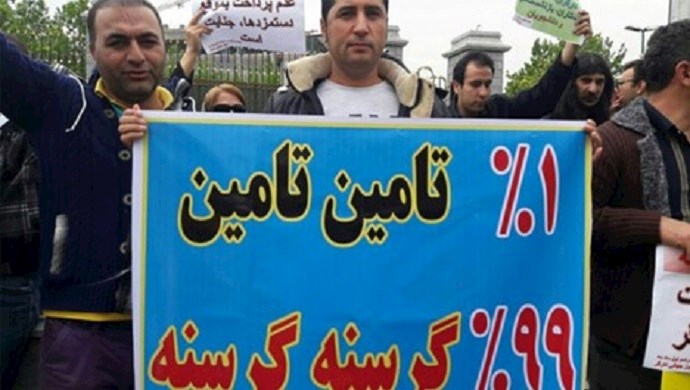Analysis by PMOI/MEK
Iran, December 29, 2020—According to a December 22 edition of the Tejaratefarda weekly, in the past eight years, government economists have gathered around the table 15 times to examine the current economic situation in Iran and possible prospects.
These experts have predicted unfortunate events for the country’s economy, but the regime’s politicians and entities do not heed these warnings about the dark future of the economy and do not take these assessments seriously.
The snowball effect
Economists Mohammad Behkish, Musa Ghaninejad, and Massoud Nili acknowledge that the future state of the economy is like an avalanche that started with small snowballs. From the above-mentioned words, we can conclude that the economic conditions of the society have gradually and periodically deteriorated.
If previous discussions were about economic growth and a smooth exit from eternal inflation and recession trap and the quality of policymaking, today, most of the regime economists are discussing the price of eggs, “borrowed bread”, chicken feet, and the livestock feed and goods stored away in customs, etc.
The fact is that today, Iran’s economy is plagued by mega-challenges and it experiences a new era in which oil no longer has the function of the past. The regime has left the global oil market and its interaction with the world has reached a minimum level. The unbalanced financial and monetary structure has turned into a snowball and will soon flow like an avalanche.
There is no hope for fundamental change and real progress
“We are in a very bad economic situation. Negative economic growth, widespread and rising unemployment, and distrust have created fragile conditions for the country’s economy. There is no hope for fundamental change and real progress, and I do not think the issues will be resolved in such a way that at least the country’s economy gets out of this confusion,” said Mohammad Behkish according to the Tejaratefarda report.
“The amount of liquidity that enters the country’s economy every minute puts markets such as the foreign exchange, gold, and housing in dangerous conditions, and the wave of destruction of this situation is likely to spread to other sectors of the economy in the future,” he added.
Ignoring science in economy
Musa Ghaninejad is another economist who considers regime officials’ refusal to accept economic science as his first serious concern. “These gentlement believe that when the situation becomes critical, economics should be abandoned. They probably think that instead of economics, they should dominate their own interests in the country. Today’s world economy has grown in the shadow of international relations and until we do not improve our relations internationally, all of our economic solutions will be short-term, temporary and unsustainable,” according to the same report.
Super challenges and open wounds
Massoud Nili is another economist who had previously drawn a five-year plan for the Iranian government. He now admits to the growing snowball that could hit the country’s economy at any moment, saying: “We all remember that when we talked about the mega-challenges of the Iranian economy, we were warning about the possibility of them happening. Today, however, unfortunately we are facing those super-challenges. Those wounds are reopened, and economists no longer need to say that the situation is not good, because all the people already feeling the various aspects of economic challenges in their own lives… Iran’s economy has been hit by high liquidity growth. The liquidity growth caused by the central bank creates the ground for inflation in the country’s economy,” according to the Tejaratefarda weekly.
According to Nili, the 32-percent growth of liquidity and 60-percent growth of the volume of money by in a one-year period has led to very high inflation. Nili acknowledges that mere reforms will not solve any problems and the regime needs big changes.
Mohammad Behkish concludes: “Now the bus is rolling down the slope and everyone agrees and even politicians have noticed. We used to have oil money and other resources that prevented the economy bus from moving toward the slope, but now this situation is quite visible.”
Interestingly, these images of the regime’s economy are portrayed by experts who are thinking of a way for the regime to survive. These people refrain from expressing many of the realities of the regime based on considerations and expediencies. However, according to them, all people feel the bankrupt economy with their own flesh and blood, and the regime has practically no solution out of this mess.





